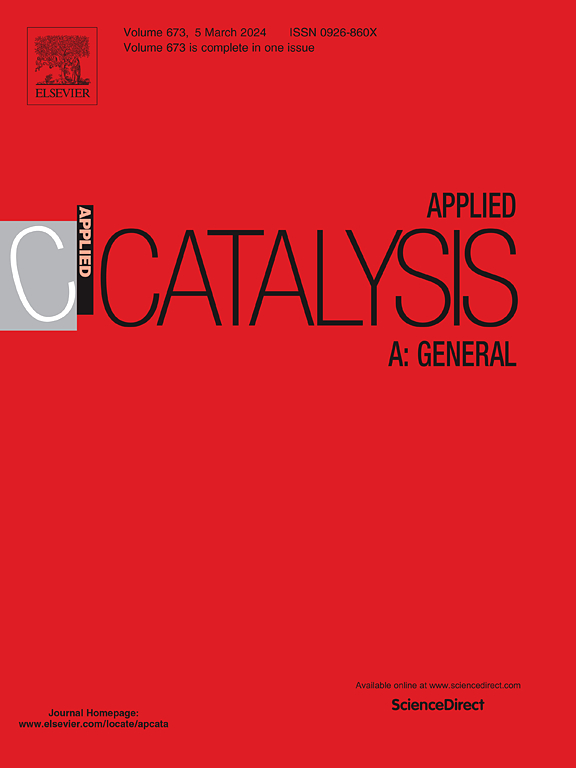Stabilizing copper particles by silanol nests on modified silicalite-1 for ethanol dehydrogenation
IF 4.8
2区 化学
Q2 CHEMISTRY, PHYSICAL
引用次数: 0
Abstract
Copper(Cu)-based catalysts are highly promising candidates for ethanol dehydrogenation owing to their exceptional activity in cleaving O-H and C-H bonds. Nevertheless, their widespread application is hindered by challenges such as rapid deactivation and complex preparation procedures. Herein, inspired by the deactivation mechanism of Cu/MFI (silicalite-1) catalysts, two strategies, i.e., using mixed solvents for impregnation and enriching silanol nests of MFI to anchor Cu particles, were used to synthesize Cu/MFI-R catalysts with high stability and activity. The mixed solvent approach reduces the surface tension of solvents, enhancing the uniform dispersion of Cu over the hydrophobic surface of MFI. Subsequently, a MFI-R support with abundant silanol nests was synthesized via optimizing hydrothermal conditions, as confirmed by reaction results and characterizations of FT-IR, UV-Vis and solid NMR. By combining these strategies, Cu/MFI-R catalysts were synthesized for ethanol dehydrogenation, achieving > 90 % ethanol conversion and 95 % acetaldehyde selectivity over the 600 h time on stream test. This work provides a very promising scalable approach for the design of stable Cu-based catalysts in hydrogen-related reactions.
硅醇巢在改性硅石-1上稳定铜颗粒用于乙醇脱氢
铜基催化剂具有裂解O-H和C-H键的特殊活性,是乙醇脱氢的重要催化剂。然而,它们的广泛应用受到诸如快速失活和复杂制备程序等挑战的阻碍。本文以Cu/MFI(硅石-1)催化剂失活机理为灵感,采用混合溶剂浸渍和富集MFI的硅醇巢锚定Cu颗粒两种策略,合成了稳定性高、活性高的Cu/MFI- r催化剂。混合溶剂方法降低了溶剂的表面张力,增强了Cu在MFI疏水表面的均匀分散。随后,通过优化水热条件合成了具有丰富硅烷醇巢的MFI-R载体,并通过FT-IR、UV-Vis和固体核磁共振表征证实了这一结果。通过组合这些策略,合成了Cu/MFI-R催化剂用于乙醇脱氢,在600 h的时间内实现了>; 90 %的乙醇转化率和95 %的乙醛选择性。这项工作为氢相关反应中稳定的cu基催化剂的设计提供了一种非常有前途的可扩展方法。
本文章由计算机程序翻译,如有差异,请以英文原文为准。
求助全文
约1分钟内获得全文
求助全文
来源期刊

Applied Catalysis A: General
化学-环境科学
CiteScore
9.00
自引率
5.50%
发文量
415
审稿时长
24 days
期刊介绍:
Applied Catalysis A: General publishes original papers on all aspects of catalysis of basic and practical interest to chemical scientists in both industrial and academic fields, with an emphasis onnew understanding of catalysts and catalytic reactions, new catalytic materials, new techniques, and new processes, especially those that have potential practical implications.
Papers that report results of a thorough study or optimization of systems or processes that are well understood, widely studied, or minor variations of known ones are discouraged. Authors should include statements in a separate section "Justification for Publication" of how the manuscript fits the scope of the journal in the cover letter to the editors. Submissions without such justification will be rejected without review.
 求助内容:
求助内容: 应助结果提醒方式:
应助结果提醒方式:


